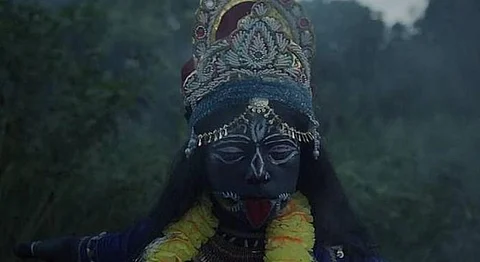
- HOMEGROWN WORLD
- #HGCREATORS
- #HGEXPLORE
- #HGVOICES
- #HGSHOP
- CAREERS
- ABOUT US
- CONTACT US

If a picture can speak a thousand words and music has within itself the capacity to make us feel emotions without even lyrics, there is something also to be said about the kind of power movement holds within that frame – the power to make us feel the intended emotion without the utterance of a single word and the sheer possibility within the narrative to heighten our senses to the movement of the music and the characters without the need for a statement offered for interpretation. Assam-based director Sourav Das’s musical mood piece Kaala thrives on our screen in this sense of movement. With no dialogues to offer refuge, it leaves you with only overwhelming emotions.
“My biggest inspiration for my artistic venture has always been my unconscious stimuli towards life around me. I have been keenly observing everything around me. My culture or people around me – everything inspires me,” Das tells us. Featuring Ajay Das and Jeevan Sanyasi, Kaala revolves around the story of a young boy who, through the course of the short film, is able to break free and seek liberation from the social stigma that surrounds him. It is, in fact, a social commentary of sorts.
The short musical mood film begins with a little boy waking up and getting ready for his day. We almost immediately notice that his right hand is amputated. He crosses the field with young boys playing football and feels his sense of yearning as he looks at them. The plot follows him as he gets on a truck to get his location, there is a certain sense of sadness in his eyes that is hard to explain.
These images are contrasted with a ritualistic madness of sorts, with costumes and fires, with men and women participating in a chaotic but confusing custom. We get a small glimpse into the past or the moments that led up to this.
The most powerful of scenes though are the ones where the small boy (decked with blue and white makeup to make him look the part) is seen running around the fire and the one where he takes it all off and decides to escape, running as fast as possible, which becomes symbolic of his running away from all the social stigma surrounding him.
There is a sense of melancholy and foreboding that dominates the mood of the film. It gives you a sinking feeling at first. As the plot moves forward, that feeling is soon changed into frustration and anger that the protagonist is feeling. The music playing in the background adds to this sense of heightened emotions.
At one level, one almost feels like the music is the major driving force towards this sense of anger that we, as the audience, also end up empathising with. We feel the yearning of the protagonist in the early stages, the dejection, the anger and the frustration in the middle and the eventual sense of escape, liberation, and freedom towards the end. In that sense then, we, as the audience, end up embodying the protagonist and that is the triumph of this narrative.
“Music has always been my source of energy toward whatever I create. Without music, I don’t think my conscious level for art would have existed. The only purpose with which I create is to put up a social mirror in front of my audiences,” Das ensures us.
In a way, I believe that words cannot do justice to the plot and emotions that Kaala leaves you with. You have to experience it for yourself – the cinematography, the mood that the music lends it and the sense of anger that you will feel and the eventual release by the protagonist’s liberation. Kaala truly holds up a mirror towards us and leaves us introspecting and reflecting.
Watch here.
If you enjoyed reading this, we suggest you also read:
